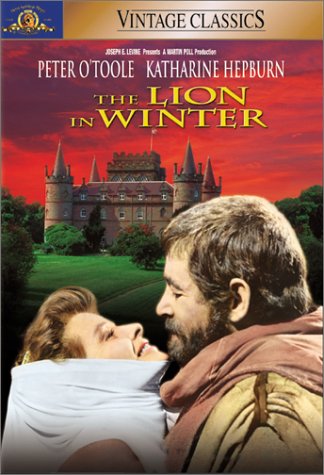
It’s Christmas of 1183, and King Henry II (Peter O’Toole) has to decide to name one of his three sons as heir to his throne. It’s an urgent matter because, many years earlier, a treasured dowry of land was paid to Henry in return for the pledge of marriage of Alais (Jane Merrow), sister of Prince Phillip of France (Timothy Dalton), to the next King of England. Now the time’s up; name the king and hold the wedding, or return the dowry.
But there are nasty wrinkles. Henry has taken young Alais as his mistress, while he has cast off and imprisoned his powerful wife, Eleanor of Aquitaine (Katherine Hepburn). Eleanor wants their eldest son, Richard (Anthony Hopkins), for the throne, a fierce warrior who sided with her in civil wars against his father. Henry insists on John (Nigel Terry), the youngest son, who is loyal to him but weak and bumbling. The middle son, Geoffrey (John Castle), is a bright, shrewd strategist, but he’s dishonest; neither wants him.
To solve the dilemma, Henry holds a Christmas Court, bringing his queen and sons together to talk things out, setting the stage for the players to connive, form alliances, backstab, and try to win it all. And if something goes sideways, these power-hungry royals are more than willing to see heads roll.
The Lion in Winter won the Academy’s Best Picture in 1968, and Hepburn took Best Actress. There’s no question why: the scenes between Hepburn and O’Toole are right out of every bitter love-hate relationship that any couple’s ever had, spectacularly written and delivered. O’Toole charms and outrages as the narcissistic, bellicose Henry, who toys with people like disposable pawns on his personal chessboard. It’s Hepburn, however, who shines the most, for her Eleanor is brilliant, eloquent, and thoughtful, a philosopher and traveler, now chained and fiercely bitter for it. Her role requires moment-to-moment shifts between deepest sorrow to soaring hope, fierce anger, sweet affection, utter despair, and the resolve of a woman never completely conquered.
The screenplay by James Goldman depicts the sons as exaggerated images of their parents’ worst qualities. It leads us to wonder, with the poison thrust and parry of this family’s endless fighting, did they ever love each other? Do they still?
If that’s all there were to this classic, no one would watch. But it’s also full of fun! Much of the fighting comes in the form of teasing and laughter based on sincere respect, if not love. It’s filmed on location in old castles in Ireland, Wales, and France—and the producers took care to make sure that it was authentically dingy, Falstaffian at times; no glorifying the life of royals here. Lovers of medieval period pieces and dark and humorous Shakespearean themes will be delighted: the action is brimming with monologues, misdirects, eavesdropping, humor, decadence, treason, and, of course, sword fighting!
The Lion in Winter is a truly extraordinary film, high on my Top Ten favorites list. Delicious, brilliant, naughty, action-filled, and, as the season promises, a little hopeful. There’s something for everyone under this medieval Christmas tree.


